Morgan James – Human
An evening pause: With Doug Wamble (guitar), Ron Mcbee (percussion), and Sam Reider (accordion). The song is by Rag’n’Bone Man.
Hat tip Judd Clark.
An evening pause: With Doug Wamble (guitar), Ron Mcbee (percussion), and Sam Reider (accordion). The song is by Rag’n’Bone Man.
Hat tip Judd Clark.
Courtesy of BtB’s stringer Jay. This post is also an open thread. I welcome my readers to post any comments or additional links relating to any space issues, even if unrelated to the links below.
Cool image time! The picture to the right, cropped, reduced, and sharpened to post here, was taken on September 1, 2024 by the high resolution camera on Mars Reconnaissance Orbiter (MRO). It shows what the scientists label “a fracture with clays.”
This canyon is about a mile and a half wide, with the floor ranging from 800 to 1,100 feet to the rim. It was not formed initially by any ice or water flow, but by a spreading of the crust, forcing cracks to form that might have later been modified by wind, ice, or water. The presence of clays in this canyon strengthens that later ice/water modification, as clays require water to form.
The streaks on the northern wall are slope streaks, an unexplained phenomenon unique to Mars. While at first glance they look like avalanches, they have no debris piles at their base, and do nothing to change the topography. In fact, streaks can sometimes go uphill for short distances, following the surface. They happen randomly throughout the year, and fade with time.
It is believed their cause is related to dust avalanches, but this is only one of a number of theories that attempt to explain them. None is entirely satisfactory.
» Read more
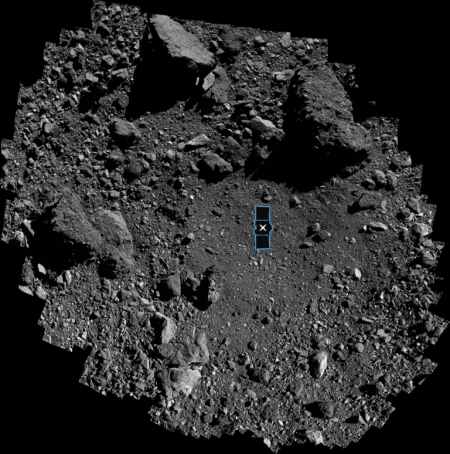
The sample site on Bennu, with OSIRIS-REx
superimposed for scale. Click for full image.
First, I hope my readers will notice that — unlike NASA and the entire press — I make no mention in my headline above of the discovery of a “mix of life’s ingredients” or “the key building blocks of life” from the samples brought back by the probe OSIRIS-REx from the asteroid Bennu.
This is the game NASA does all the time, to hint at the discovery of life when this is not the real discovery. NASA does it because it knows that if you hint at such a discovery, the press will go crazy and give you lots of press.
The real news from the two papers published this week, available here and here, however, is more fundamental. Before the samples from Bennu and Ryugu (brought back by the Japanese probe Hayabusa-2) had arrived, our understanding of the make-up and chemistry of the early solar system was very incomplete and badly biased. The only asteroid samples we had of carbonaceous chondrite asteroids, the most primitive and fragile carbon-rich asteroids in the solar system, had came from meteorites that had survived the journey through the Earth’s atmosphere. Thus, the only material that survived was robust enough to do so. The more fragile molecules however were always destroyed and thus missing from meteorites, even though it was very clear from spectroscopy of these asteroids in the solar system that such molecules did exist, and likely formed the majority of these asteroids’ make-up.
Thus, though carbonaceous chondrite asteroids represent the early solar system, our understanding of them was warped and very incomplete. The whole point of both missions to Bennu and Ryugu was to fill in this data, to get a more complete census of the real make-up of the early solar system.
The two papers published this week have given us that. That’s their real discovery.
» Read more
Link here. As usual, this NASASpaceflight.com article provides an excellent overview of what SpaceX is likely to do on the next few test flights, including details about the possibility of reusing the Superheavy that was successfully recovered on the seventh flight.
And as usual, NASASpaceflight.com ignores the importance of politics and Trump’s election in changing the regulatory culture at the FAA. Just as it has made believe the Biden administration wasn’t forcing the FAA to slow-walk its license approvals to SpaceX, it is now making believe the Trump administration won’t do anything to force the FAA to speed its approvals.
We know however that it will. I fully expect that when SpaceX completes its investigation of the failures from flight 7 and describes its fixes, the FAA approval will following very quickly thereafter, within days. Under Biden that approval would still take months.
Despite high launch cost of the Ariane-6 rocket, the European Space Agency (ESA) this week arranged three more launch contracts with Arianespace, which manages the rocket.
During the 17th European Space Conference, held in Brussels on 28 and 29 January, Arianespace was awarded contracts to launch PLATO [an ESA science mission to study exoplanets], Sentinel-1D [an ESA Earth observation satellite], and a pair of second-generation Galileo satellites. [part of ESA’s GPS-type satellite constellation]. Arianespace currently has a backlog of 30 Ariane 6 launches, 18 of which are for Amazon’s Kuiper constellation.
These new launch deals are expressly because ESA wants to force feed contracts to Ariane-6 to keep it whole, as part of its policy to launch its European payloads on European rockets. The result is that ESA is also forced to pay too much for its launches. Note too that these payloads are expressly ESA science or research projects, which also applies to most of Ariane-6’s backlog of launches outside of its Kuiper launches. Profit is not the main goal of these payloads. I doubt this rocket will get much additional business from commercial satellite companies that must make a profit to survive. It costs too much.
This is also the reason ESA member nations Germany, Italy, France, and the United Kingdom are pushing hard to get new European private rocket startups operational. They don’t like being forced to pay too much for launches, and want commercial options outside of Ariane-6.
For the moment however ESA is propping up Ariane-6 and Arianespace. It means Ariane-6 will be around for awhile, even as it limits what ESA can do in space.
Embedded below the fold in two parts.
To listen to all of John Batchelor’s podcasts, go here.
» Read more
SpaceX tonight successfully launched the first satellite in a constellation of two Spanish communications satellites, the Falcon 9 rocket lifting off from the Kennedy Space Center in Florida.
The first stage completed its 21st flight. Because of the fuel needed to get the satellite into its proper orbit, the stage was not recovered.
The 2025 launch race:
13 SpaceX
6 China
1 Blue Origin
1 India
An evening pause: Performed live 2011.
Hat tip Alton Blevins, who needs to clean out his inbox, which is now so full all of my emails to him bounce.
The asteroid mining startup Astroforge today finally named the asteroid that its first commercial interplanetary mission will do a close fly-by, set to launch as a secondary payload on a SpaceX Falcon 9 on February 26, 2025.
The mining startup is headed to asteroid 2022 OB5 as soon as Feb. 26, launching alongside Intuitive Machines’ second lunar mission. CEO Matt Gialich told Payload that they picked that asteroid for the initial mission for a few reasons:
- It’s under a kilometer wide.
- It could be a high-value, metal-filled M-type asteroid.
- AstroForge’s spacecraft will fly by the asteroid when it’s close to Earth, so imagery can be sent back quickly.
This will be Astroforge’s second mission, the first being an Earth-orbit demo flight to prove out its systems. The spacecraft, dubbed Odin, was quickly prepped when the planned satellite satellite failed vibration testing. The company quickly replaced it with the cubesat intended for the third mission.
The company is also proud that the entire cost for this asteroid mission is just $6.5 million. “Hopefully we’re going to show the world that NASA doesn’t need to be funded for $5B missions when we can do it for much less,” said Gialich. The company also announced it has signed a multi-launch contract with the rocket startup Stoke Space, though no specifics were released.
Hat tip BtB’s stringer Jay.
Courtesy of BtB’s stringer Jay. This post is also an open thread. I welcome my readers to post any comments or additional links relating to any space issues, even if unrelated to the links below.
In releasing a new update on its Iphone operating system, Apple quietly revealed that it has joined T-Mobile’s partnership with SpaceX to use a subconstellation of Starlink satellites with direct-to-cellphone capability, thus acting as orbiting cell towers to fill in gaps in T-Mobile’s service.
Originally spotted by Bloomberg, it seems that Apple has secretly worked with SpaceX and T-Mobile U.S. to provide an alternative satellite service. This is quite a surprise, as T-Mobile had previously specified Starlink as an option for Samsung phones, like the Galaxy S25 Ultra and the Galaxy Z Fold 6. Meanwhile, Apple has an in-house Satellite connection service due to a partnership with Globalstar Inc.
However, the Bloomberg report states that a select number of iPhone users have been able to enable the Starlink beta through T-Mobile. While we don’t know which models will be compatible as of yet, T-Mobile told Bloomberg that the full release will support the vast majority of iPhones.
The system is being tested right now, but still requires FCC license approval.
Yesterday Elon Musk posted what appeared to be a completely silly tweet stating that Trump “has asked SpaceX to bring home the 2 astronauts stranded on the Space_Station as soon as possible. We will do so. Terrible that the Biden administration left them there so long.”
Since a Dragon capsule for bringing these astronaut back to Earth is already docked to ISS and is scheduled to return in April, there is nothing really new about Musk’s tweet. Moreover, that April return was delayed an extra two months because of SpaceX, not Boeing or Biden. The company had requested that extra time to prepare the next crew capsule for launch, because it is a new capsule never used before.
It is of course possible that Trump requested SpaceX and NASA to reconsider this extra two month delay, and move the crew return back to February, but that change would either require SpaceX to find a different older capsule for the next crew, fly the new capsule sooner than planned, or have the total number of NASA astronauts on ISS reduced to just one until the new capsule launches with the new crew in March. None of these options seems wise.
I suspect nothing will change, and Musk was merely trolling the press. And the press mostly fell for it, hook, line, and sinker.
Most of these stories fail to outline the reasons for the most recent delays, having nothing to do with Biden. The last four especially make it sound as if SpaceX has suddenly been enlisted for a rescue mission, a claim that is utterly false.
None have been able to get any confirmation of any change of schedule from NASA or SpaceX, suggesting that Musk’s tweet was entirely blarney that a smart press would have ignored without that confirmation. Our stupid mainstream press however could not do that. It went whole hog based on nothing.
Until NASA announces a change in schedule there simply is no story here, and that’s what I am reporting.
New data that has refined the solar orbit of 200-foot-wide asteroid discovered in 2024, dubbed 2024 YR4, suggests it has a 1-in-83 chance of hitting the Earth on December 22, 2032.
“Odds have slightly increased to 1 in 83,” Catalina Sky Survey engineer and asteroid hunter David Rankin wrote on BlueSky. “This is one of the highest probabilities of an impact from a significantly sized rock ever.”
Amateur astronomer Tony Dunn shared a simulation of the asteroid approach on his X feed. “Recently-discovered #asteroid 2024 YR4 may make a very close approach to Earth in 8 years. It is thought to be 40-100 meters wide. Uncertainty is still high and more and more observations are needed confirm this.”
The asteroid is rated three on the Torino risk scale, which indicates a close encounter that warrants close attention from astronomers and an over 1% chance of impact.
Though most reports say the asteroid is about 200 feet across, there is great uncertainty in that number. It could also be as large as 320 feet, or as small as 130 feet.
At the moment the risk of impact is still small. If it does occur, there is a chance it could either cause a major airburst similar to the Chelyabinsk meteor impact in 2013 that injured more than 400 people, or even impact the ground or ocean. If it hits the ocean there is a considerable risk of tsunamis. At the moment it appears its path will cross from South America to Africa in the southern hemisphere, but this data remains very uncertain at this time.
Though there will be doom-sayers, overall this is not a world destroyer. It carries some risk, but we have eight years to refine our knowledge significantly, especially when it will make a close approach of five million miles in 2028. At that time scientists should be able to better measure its size as well as its future orbit, determining more precisely whether it will even hit the Earth in 2032.
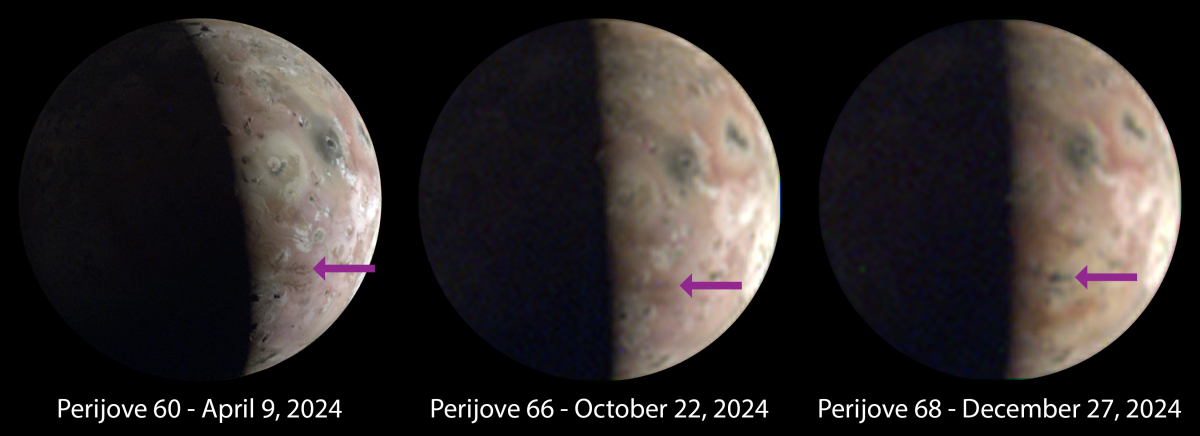
Changes on Io since April 2024. Click for original image.
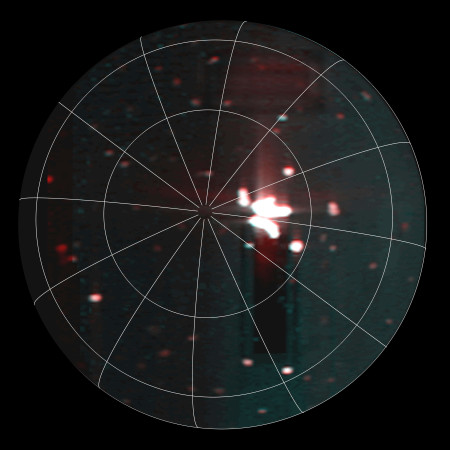
Infrared detection of volcanic hot spot.
Click for original image.
Using Juno’s Italian JIRAM infrared instrument image as well as its optical camera, scientists have detected what appears to be the largest volcanic event yet measured on the Jupiter moon Io, covering an area larger than Lake Superior,
Scientists with NASA’s Juno mission have discovered a volcanic hot spot in the southern hemisphere of Jupiter’s moon Io. The hot spot is not only larger than Earth’s Lake Superior, but it also belches out eruptions six times the total energy of all the world’s power plants.
…The JIRAM science team estimates the as-yet-unnamed feature spans 40,000 square miles (100,000 square kilometers). The previous record holder was Io’s Loki Patera, a lava lake of about 7,700 square miles (20,000 square kilometers). The total power value of the new hot spot’s radiance measured well above 80 trillion watts.
The pictures above were taken by Juno’s optical camera during the last three close flyby’s, looking down at the south pole, with the red arrows indicating the change to the pole’s right during each pass. The infrared image to the right shows a similar view during the fly-by, and shows that same hot spot as the bright area to the pole’s right.
Juno will do another fly-by of Io in March, though from a greater distance. Scientists plan to use both instruments to see how this hot spot has changed again since the end of December.
The government of the United Kingdom has made a sudden and unexpected $25 million grant to the British rocket startup Orbex, which recently announced it was abandoning its launchpad at the Sutherland spaceport and switching to the Saxavord spaceport on the Shetland Islands.
While the UK Government has supported Orbex through grants awarded via the European Space Agency’s Boost! programme, the £20 million investment appears to represent the state acquiring a stake in the company and its future. This signals a significant show of support from the government as the company gears up to compete in the European Launcher Challenge.
Channeling former NASA Administrator Jim Bridenstine, Technology Secretary Peter Kyle declared that the government’s backing of Orbex would enable the launch of “British rockets carrying British satellites from British soil.”
It seems to me that this cash award is less an investment in the company and more a kind of guilt payment by the United Kingdom government because the red tape of its bureaucracy, the Civil Aviation Authority, prevented Orbex from launching at Sutherland for almost three years, delays that eventually forced the switch to Saxavord, which after its own long red tape delays finally has its license approvals not yet issued to Sutherland.
Orbex has probably indicated to the government that these delays have caused it significant cash flow problems, similar to what happened to Virgin Orbit where red tape delays eventually drove it to bankruptcy. The company also probably told the government it needed extra cash to prepare the launchpad at Saxavord for its rocket, money it had already spent at Sutherland and no longer had.
Thus, this $25 million government grant. The UK government realized that if a second rocket company went belly-up due to its red tape, it would likely end forever any chance of getting any rocket company from considering launching from the United Kingdom.
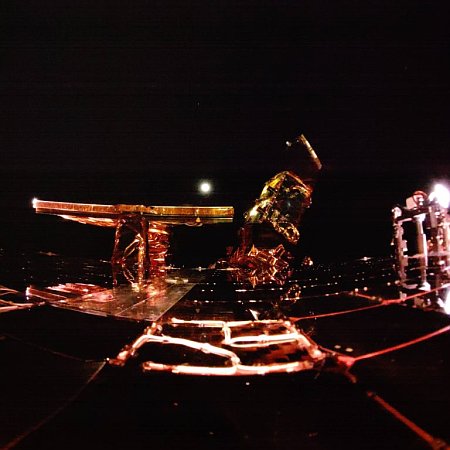
Blue Ghost’s first view of the Moon.
Click for original image.
Firefly’s Blue Ghost lunar lander has successfully completed its second orbital burn, raising its Earth orbit in preparation for its shift into lunar orbit in the coming weeks.
Routine assessments while Blue Ghost is in transit show that all NASA payloads continue to be healthy. Firefly and NASA’s payload teams will continue to perform payload health checkouts and operations before reaching the Moon, including calibrating NASA’s Lunar Environment Heliospheric X-ray Imager (LEXI), continued transit operations of the Lunar GNSS Receiver Experiment (LuGRE), and analysis of radiation data collected from the Radiation Tolerant Computer (RadPC) technology demonstration.
The picture to the right looks across the top of Blue Ghost, with the small bright object beyond its first image of the Moon. The actual landing is at least four weeks away.
India today successfully launched the second in a new generation constellation of that country’s GPS-type satellites, its GSLV rocket lifting off from its Sriharikota spaceport on the east coast of the subcontinent.
The 2025 launch race:
12 SpaceX
6 China
1 Blue Origin
1 India
An evening pause: Performed live 2013 in Hong Kong when it was still free. I wonder if the Chinese would allow an American band there now.
Hat tip Diane Zimmerman.
Courtesy of BtB’s stringer Jay. This post is also an open thread. I welcome my readers to post any comments or additional links relating to any space issues, even if unrelated to the links below.
Cool image time! The picture to the right, cropped, reduced, and sharpened to post here, was taken on October 25, 2024 by the high resolution camera on Mars Reconnaissance Orbiter (MRO). Labeled merely as a “terrain sample,” it was likely taken not as part of any specific research project, but to fill a gap in the camera’s schedule so as to maintain the camera’s proper temperature.
The terrain is definitely blobby, with some hollows appears to have ripple dunes suggesting dust and sand. The rounded mounds and some hollows however suggest instead near surface ice or places where sublimation of that underground ice caused the hollows.
Some of the circular depressions might suggest impact craters, but if so, those craters have been significantly modified and softened since impact. Some do appear to be filled with glacial debris.
» Read more
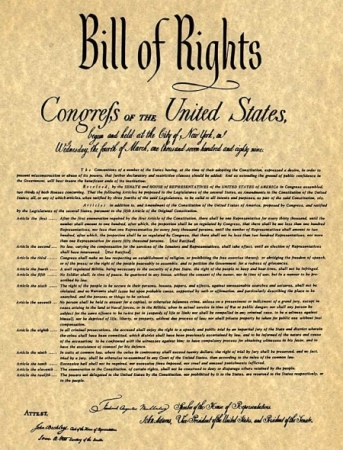
The Bill of Rights, still in force
In the past few months, since Trump won re-election in November, the string of legal and political victories by the thousands of individuals blacklisted by the left and the Democratic Party in the past decade has been so overwhelming that for me to report each story as it happened would have required me to change the focus of this website entirely, something I did not wish to do.
Instead, I have collected a short list of these victories, hardly complete, and am now posting them here in one essay. This will not only put these victories on the record, it will show unequivocally how many leftists since 2020 somehow came to believe they were not required to follow the law in imposing their leftist agenda on others. The belief however was a delusion. It has just taken a few years to make the rule of law regain its primacy.
Read now and celebrate. Note also that Trump’s election win was completely irrelevant to most of these stories. While his return to the presidency clearly accelerated the trend, the trend had been established long before his election. And that trend has only just begun.
» Read more
Arianespace now plans to launch the Ariane-6 rocket five times in 2025, with the first launch scheduled for February 26, 2025.
On 13 and 14 January, the Ariane 6 core stage stack and two solid-fuel boosters were successfully brought together on the ELA-4 launch pad. While this process was occurring, an Antonov transport plane touched down at Felix Eboué Airport carrying the rocket’s payload, the CSO-3 reconnaissance satellite.
This will be the first commercial payload launched by Ariane-6, a military reconnaissance satellite for France.
In addition, the Vega-C rocket is scheduled for six flights, though some of those flights might be arranged and controlled by the rocket’s Italian builder, Avio, not the European Space Agency’s commercial arm, Arianespace. Sometime in the next two years Arianespace’s responsibiilty for Vega-C is being phased out, so that Avio will own and sell all further launches.
UPDATE: The XB-1, using the exact same air corridor used by Chuck Yeager when he became the first pilot to break the sound barrier in 1947, has successfully become the first privately funded and constructed airplane to fly faster than the speed of sound, doing it three times for about six minutes total.
Original post:
—————————
The airplane startup Boom Supersonic is hoping to complete its first manned supersonic flight today, piloted by chief test tilot Tristan “Geppetto” Brandenburg.
The flight will be manned, using its prototype XB-1 test plane.
Since March 2024, Boom has carried out 11 test flights as it gradually pushed the envelope toward breaking the sound barrier. [Today’s] flight of the 68-ft-long (21-m) XB-1 prototype will be conducted in a special air corridor reserved for supersonic aircraft. During the 38-minute flight at an altitude of 34.000 ft (10,000 m), the aircraft is expected to reach Mach 1.1, which is half of the ultimate goal of Mach 2.2.
Once the company completes test flights of XB-1 it will begin building its Overture commercial supersonic plane for sale to airline companies, capable of carrying up to 80 passengers. It already has contracts and financial support from a number of major airlines, including United and Japan Airlines.
I have embedded the live stream below. It has already started.
» Read more
In announcing its plans to begin launches from both Wallops Island in Virginia and Esrange in Sweden in 2026, Firefly has also said it is planning five launches from Vandenberg in 2025.
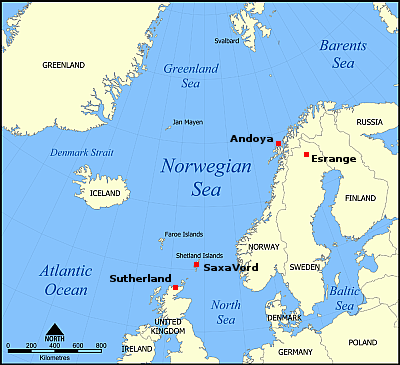
Proposed spaceports surrounding Norwegian Sea
The company is also building a launchpad at Cape Canaveral, so if these plans reach fruition it will eventually have four different launch sites. One issue for all these sites remains red tape. For example:
[Firefly VP Adam] Oakes said Firefly is continuing to work on regulatory issues for launches from Esrange. “The regulatory piece can really put you back if you want to let it,” he said. “We have a lot of paperwork in place. We’re not quite there on everything but things are moving in the right direction.”
One serious problem for Esrange is its interior location in Sweden. Any orbital launch will have to cross land, with most crossing significant territory of other countries. While the site has been used for decades for suborbital test launches, no orbital launches have ever taken off from there, and getting clearance will not be easy for orbital rockets to cross either Norway, Finland, or Russia. And unless the lower stages are reusable they will have to crash inside those territories, or inside Sweden itself.
An evening pause: Hat tip Judd Clark, who provides this translation:
O flower flower
O flower flower bouquet bouquet
I’m for you
I’m for you
I’m crazy for you
I’m crazy, I’m crazy
I’m crazy, this is trueWhere did you go that I was always on your mind
I’m dying from missing you because I cannot see you
Where did you go that I was always on your mind
I’m dying from missing you because I cannot see you
SpaceX today successfully launched another 21 Starlink satellites, including 13 with direct-to-cell capabilities, its Falcon 9 rocket lifting off from Cape Canaveral in Florida.
The first stage completed its 20th flight, landing on a drone ship in the Atlantic. At this time the first iteration of the direct-to-cell Starlink sub-constellation is largely complete, and the company has begun beta testing using these satellites directly with smartphones on Earth.
The 2025 launch race:
12 SpaceX
6 China
1 Blue Origin
Courtesy of BtB’s stringer Jay. This post is also an open thread. I welcome my readers to post any comments or additional links relating to any space issues, even if unrelated to the links below.

Click for full resolution panorama. For original images, go here, here, and here.
Cool image time! The panorama above was created by me using three pictures taken today (here, here, and here) by the right navigation camera on the Mars rover Perseverance. The top of the rover can be seen to the right, as well as its tracks.
The overview map to the right provides the context. The blue dot marks Perseverance’s present position. The white dotted line its past travel route, with the red dotted line indicating the planned route. The yellow lines indicate the approximate area covered by the panorama.
Though the planned route had the rover head west and then south, the rover team instead had the rover retreat eastward about 450 feet the past few days, where it sits now. At the previous western location the team had attempted to find a location to drill a sample core, but apparently the ground was not satisfactory. By retreating to this previous location it could be they think they will have better luck.
What strikes me about this hilly terrain just outside Jezero Crater is its barrenness. You would have great difficulty anywhere on Earth finding terrain so empty of life. On Mars however there is nothing but dirt and rocks, for as far as the eye can see.
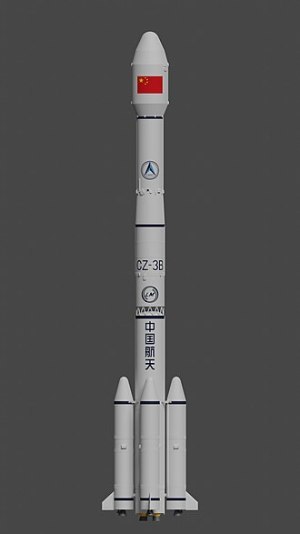
Long March 3B
One of the four strap-on boosters used by a Long March 3B rocket that was launched yesterday from the Xichang spaceport in southwest China ended up crashing right next to a home.
The TJS-14 satellite launched on a Long March 3B rocket from Xichang Satellite Launch Center on Thursday at 10:32 a.m. EST (1532 GMT; 11:32 p.m. local time). The satellite is safely on its way to geostationary orbit, but one of the rocket’s four strap-on side boosters fell to Earth in a populated area of Zhenyuan County in Guizhou province.
Security camera footage posted on the social media platform Sina Weibo captured the scene of two family members reacting to an explosion near their home that lit up the night sky. Fortunately, the booster, which exploded on impact, fell in what appeared to be hills above the house.
The video can be viewed here. While the booster apparently missed the house, any remaining hypergolic fuel in the booster posed a very serious health threat, especially if it was released as a gas. That fuel is extremely toxic, and can dissolve skin if it makes contact. I would expect that until a major clean-up occurred at the crash site, the people that lived in that home will have to evacuate.
China has said that it intends to replace all of its hypergolic-fueled rockets with liquid-fueled, and is expanding operations at its Wenchang coastal spaceport as well. When however these rockets stop launching from its interior spaceports remains unknown. It is likely in fact that toxic stages will continue to fall on the heads of Chinese citizens for years to come.